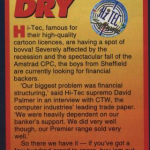And so the list continues with yet more Hi-Tec games added into the archive. This time with “Sylvester and Tweety Pie” which was a platformer where you had to try and catch Tweety Pie and you could scale walls, but some walls had ‘goo’ on them which meant that Sylvester would slide down the wall if you weren’t quick enough to scale it.
Craig Kelsall was assigned to doing the conversion and recalls seeing the Amiga version which had the basic wall scaling feature with graphics from Potsworth being used. Craig is rumoured to have got a demo to the same level with graphics being borrowed from Potsworth. Craig was surprised that the Amiga version never got a release, but we confirmed this by checking the release lists.
Gary Antcliffe was doing the Amiga conversion and confirmed that Hi-tec went under before it could be complete. His recollection was that the game was a simple platformer along similiar lines to Scooby and Scrappie Doo, though they were trying to push the tech a bit more as they were trying to get Sylvester to run up slopes in a similar way to Sonic. Apparently Tweety wasnt in the game at this point. (Sadly Gary nolonger has any of his Amiga disks any more)
Richard Morton worked on the Amiga graphics, and he mentions that the Sonic Slopes were being borrowed from another development that never made it (Speedy Gonzales). The original tech was used from Wacky Races. He adds to the game play saying that it had a dash of Spy Vs Spy in it with Sylvester having to go around and set up traps for Tweety Pie. He mentioned having disks possibly still, so this could be something for AGTW in the future.
However sadly Craig no longer kept any of his C64 materials. Andrew Routledge, who is believed to have been doing the C64 graphics, never kept his disks either so it seems the only person who could have anything is Dave Palmer, but it seems unlikely now.
This is all we know at present – nothing was mentioned in the press it seems, maybe you know more?
Is it possible to find this title?
Contributions: Craig Kelsall, Gary Antcliffe, Richard Morton

